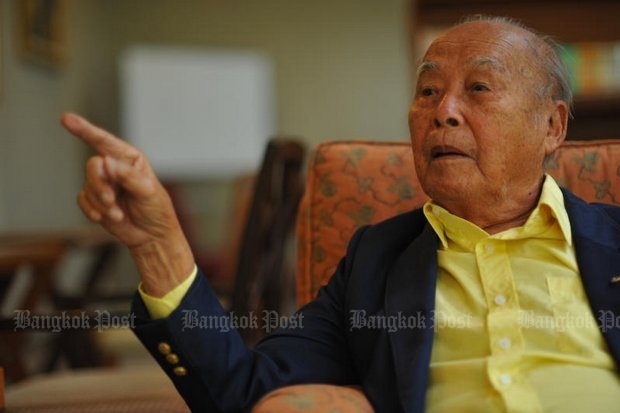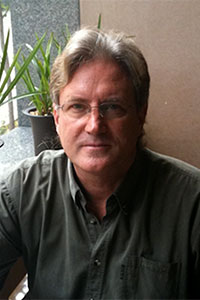
At this very moment, we need no further proof to realise that military men and democracy are always on the opposite side. Yet every rule has an exception.
And this is one such exception. Gen Saiyud Kerdphol, a professional soldier who retired from the army as supreme commander. Apart from his militaristic capability, Gen Saiyud, now 93 and keeping low profile, is long known for his deep faith in democracy.
Legend had it that Gen Saiyud turned down quite a few requests from his colleagues that he lead a coup when the country was trapped in political deadlock. After his mandatory retirement, he took a political role in a poll monitoring agency to ensure clean politics.
Born in 1922 during the Sixth Reign, the Sukhothai native was of fighting age during World War II and saw action engaging Japanese troops on the Burmese border. In the early 1950s he went to the US to further his military education at Fort Benning, Georgia, "at a time when Thai generals still chewed betel nut and had no understanding of a modern army" and a few years later chose to study again, this time in Australia, sensing its upcoming importance as a regional neighbour.
When the US-leaning Gen Sarit Thanarath took power from the ambiguously neutral Plaek Phibulsonggram, Gen Saiyud, who knew the former from their fighting days in Burma, was called upon to help modernise the Thai military with a focus on administration, strategy and intelligence. US aid and advisers started to pour in.
During our discussion late last month, he gave a flash-back of his military career. Since our talk took place at a time of political unease, as there have been indications that the military may attempt to prolong its hold on power, we started with the question: Why does Thailand have so many coups d'etat?
Speaking in Thai, Gen Saiyud explained that the Western term "coup" was inadequate to express what was really happening in Thailand. There was a real coup in 1932, one that changed the system of governance, but the coups since then were largely limited to changing the leadership team while keeping the bureaucracy, military and system of governance intact.
Most of the coups were bloodless, he added, and born of deadlocks and intractable conflict. What do you do when only the military has the power to step in? He cited the red shirt-yellow shirt street brawls as an example of social disruption that needed to be pacified.
He agreed when I noted that the military might possess the skills to pull off coups, but it didn't necessarily possess the skills to run a country.
It's one thing to take power, another thing to administer, he said.
Back in the era of the insurgent communist threat in the 80s, Gen Saiyud pushed for the controversial reconciliation strategy of bringing Thai communists back into the fold of Thai society.
Although many years have gone by since he was at the pinnacle of strategic power, his nuanced approach to disarming enemies through a combination of hard and soft power that respects and addresses discontent and attendant needs seems as relevant today as ever.
I asked the general how Thailand could heal its internal divisions and he immediately took me back to the mid 1960s when the Communist Party of Thailand (CPT) began its armed struggle against the Thai state. "It wasn't for them to win," he stated, "it was for us to lose." The CPT was following an outdated model based on Mao Zedong's Yanan outpost based on the idea of a rural liberated zone.
By the time the US withdrew from the Vietnam War, the Thai government under Gen Kriangsak Chomanan, whom he referred to as "a good friend of mine", pursued a reconciliation policy in the city and the jungle, overseeing the release of student leaders unfairly imprisoned after Oct 6, 1976, seeking to put a wedge between hardcore jungle fighters and their naive student supporters.
"We also pursued state-to-state cooperation with China which really helped," he said.
Bullish on economic development as the magic bullet that makes real bullets unnecessary, Gen Saiyud cited the case of China where communism was weakened naturally as the country became more prosperous, suggesting that economic growth could achieve results not available on the battlefield.
Winning battles by non-military means was certainly evident in his innovative counter-insurgency strategy that helped Thailand evade the bloody anti-communist crusades that decimated its neighbours.
"Thais don't like being told what to do," he concluded, "but they know what has to be done. Unity is paramount. We will take care of our national interest."
Philip J Cunningham is a media researcher covering Asian politics.
